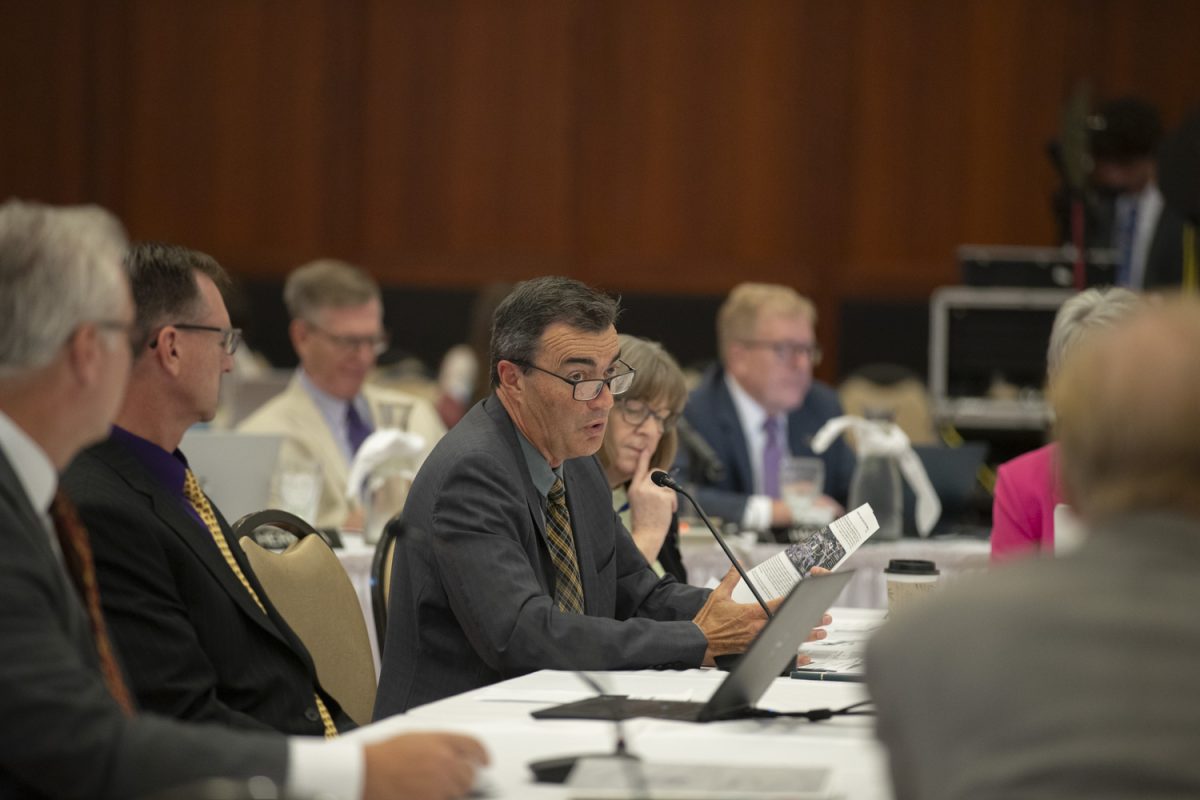AMES, Iowa — The University of Iowa was approved to restructure and terminate multiple programs within the College of Liberal Arts and Sciences at the Iowa Board of Regents meeting on Thursday.
Center for Social Science Innovation
UI Executive Vice President and Provost Kevin Kregel proposed approval from the board to create the Center for Social Science Innovation, which will replace the current Public Policy Center.
Learn more:
In 2023, a task force was created with the intention of redesigning the Public Policy Center’s mission, organizational structure, and operational function to create a new social sciences research center.
“The proposed center will provide mechanisms to enable social scientists at the university to generate practical but critical insights about fundamental issues,” Kregel said. “We will provide strategic resources to support high impact innovative research, foster interdisciplinary collaboration, maintain strong partnerships with other centers on their campus as well as the other regents institutions, and facilitate contract and grant development, and finally, collaborate with constituents from Iowa’s communities to solve local challenges.”
The proposed center will make research incubation, grant developing and programming, survey and multimethodology research services, and communication and dissemination its four core priorities.
The center aligns with UI’s strategic plan, Kregel said, as it will provide opportunities for advanced research and discoveries, improving student, faculty, and staff success and expanding the university’s impact on local and regional communities.
UI has held conversations with Iowa State University and the University of Northern Iowa concerning the proposed center, and they both fully support the new development.
The proposed center at the UI focuses on survey methodology and evaluation services, which does not compete with the Center for Social and Behavioral Research at UNI, as they focus on providing applied research services to UNI faculty, community organizations, and state and national clients.
The Center for Survey Statistics and Methodology at Iowa State University has services that complement those of the proposed UI center but are more advanced and focus more on agricultural services, which is not one of the UI’s focus areas.
No additional staff or resources are needed for the transition.
Administrative Restructures and Program Terminations
UI Associate Provost for Undergraduate Education Tanya Uden-Holman proposed reorganization for the Division of World Languages, Literatures, and Cultures, the Department of Earth and Environmental Sciences, and the Department of Geographical and Sustainability Sciences.
Uden-Holman, on behalf of the university, proposed restructuring five separate departments into two simpler departments: the Department of Spanish and Portuguese and the Department of Languages, Linguistics, Literatures, and Cultures, also known as the LLLC.
RELATED: UI College of Liberal Arts and Sciences departments considered for restructuring
The restructure would close the current division, the Department of French and Italian, the Department of German, the Department of Linguistics, and the Department of Asian and Slavic Languages and Literatures.
All closed departments would transfer to program status as a part of the LLLC, with the exception of the Bachelor of Arts in Portuguese, which would permanently close due to low enrollment.
According to the closure request, there have been no students enrolled in the Portuguese program since 2021. Students would still be able to complete a minor in Portuguese and take Portuguese general education courses.
“Bringing the faculty and administrative and academic staff together into two departments will help the college reduce costs and administrative duplication and also deliver curriculum and teaching activities more efficiently,” Uden-Holman said in her presentation to the board on Wednesday.
Uden-Holman informed the board that current undergraduate and graduate students enrolled in all related programs will not be impacted, as no curricular changes are taking place.
The changes will go into effect in August 2025 and are expected to be permanent.
Uden-Holfman also proposed the addition of the School of Earth, Environment, and Sustainability, also known as SEES.
The proposal would close the departments Earth and Environmental Sciences and Geographical and Sustainability Sciences and combine them into the SEES.
As mentioned in the proposal, the CLAS based the decision on a review of comparable programs at peer institutions, which found similar administrative and academic changes to increase opportunities for research, funding, and experiential learning.
Uden-Holfman noted that changes were approved by the faculty of both departments.
The UI is seeking to terminate a number of programs from the existing Department of Geographical and Sustainability Sciences, including:
- Bachelor of Science in Environmental Policy and Planning
- Bachelor of Arts and Bachelor of Science in Geography
- Bachelor of Science in Sustainability Science
“Students interested in programs in Environmental Policy and Planning, Geography, or Sustainability Science will be able to choose from the proposed new BA or BS degrees in Geographical and Sustainability Sciences or the existing BA or BS degrees in Earth and Environmental Sciences or the BA degree in Environmental Policy and Planning,” the report reads.
The geoscience degree options are also being replaced with the new Bachelor of Arts and Bachelor of Science in Earth, Environment, and Sustainability. The university will be offering tracks in Earth and Planetary Science, Environmental Geoscience, and Ecology.
Current students will have the option to complete their program, Uden-Holman mentioned.
“The intersection will also provide opportunities for students to participate in integrated, interdisciplinary research and education opportunities, instead of a distributed set of related academic programs split across different academic departments,” Uden-Holman said.
CLAS shared the new school proposal with colleagues at ISU and UNI, who were supportive, Uden-Holman shared with the board.
Uden-Holman shared that data from the Bureau of Labor Statistics indicates a 40-80 percent increase in jobs related to the fields of environmental and sustainability sciences.
The new degree program will be effective next fall.
Editor’s note: A previous version of this article incorrectly described the changes coming to the geoscience degree options. The DI regrets this error.



